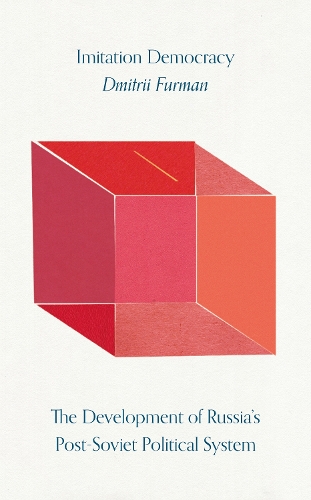
Imitation Democracy: The Development of Russias Post-Soviet Political System
(Hardback)
Publishing Details
Imitation Democracy: The Development of Russias Post-Soviet Political System
By (Author) Dmitrii Furman
Foreword by Keith Gessen
Afterword by Tony Wood
Verso Books
Verso Books
31st January 2023
United Kingdom
Classifications
General
Non Fiction
Society and culture: general
320.947
Physical Properties
Hardback
208
Width 140mm, Height 210mm, Spine 19mm
302g
Description
After the collapse of the Soviet Union, Russia under Yeltsin and Putin implemented a political system of imitation democracy, marked by a huge disparity between formal constitutional principles and the reality of authoritarian rule. How did this system take shape, how else might it have developed, and what are the prospects for re-envisioning it more democratically in the future These questions animate Dmitrii Furmans Imitation Democracy, a welcome antidote to books that blandly decry Putin as an omnipotent dictator, without considering his platforms, constituencies, and sources of power. With extensive public opinion polling drawn from throughout the late- and post-Soviet period, and a thorough knowledge of both official and unofficial histories, Furman offers a definitive account of the formation of the modern Russian political system, casting it into powerful relief through comparisons with other post-Soviet states. Peopled with grey technocrats, warring oligarchs, patriots, and provocateurs, Furmans narrative details the struggles among partisan factions, and the waves of public sentiment, that shaped modern Russias political landscape, culminating in Putins third presidential term, which resolves the contradiction between the form and content of imitation democracy, the formal dependence of power on elections and the actual dependence of elections on power.
Reviews
In the flatlands of post-communism, one exceptional figure always stood out. Uniquely, in the mind and character of Dmitri Furman the two distinct incarnations of the Russian intelligentsia came together, at a time when both seemed to have all but disappeared. Virtually unknown outside the country, and little registered within it, he was a scholar of comparative religion and an anatomist of the aftermath of the USSR who joined political integrity and intellectual originality in a body of work that addressed the fate of his country, and the past of the world, in ways that were equally and strikingly passionate and dispassionate. -- Perry Anderson * London Review of Books *
Russia is an imitation culture. Throughout the country's history it has formulated its existence using European formulas. But then unable to compete on the well-established democratic terms Russia has repeatedly positioned itself as a special civilization, in essence, what the West is not. Dmitry Furman's book discusses one of the most important moments in russian history - transition from communism to democracy, as it were. At the time it seemed that Russia's cycle of imitation of the West and then the resentment that it cannot or doesn't not want to follow the rules, could finally be broken. Despite all the democratic promises it was not. Furman brilliantly and meticulously explains as why Russia constantly falls into an autocratic trap of its own making. His is a sober analysis not only of Russia's past but also grim prospects for democracy in its future. -- Nina Khrushcheva, professor of international affairs, The New School, New York
Author Bio
Dmitrii Furmans first book, Religion and Social Conflicts in the USA, was published in the USSR in 1981. In later years he became a leading scholar of post-Soviet political development, and theorist of imitation democracy, publishing books on a number of former Soviet republics before his death in 2011.
